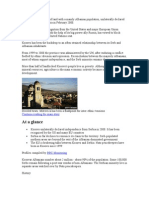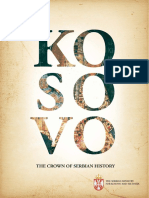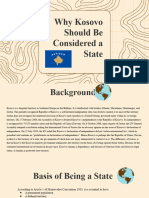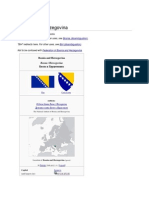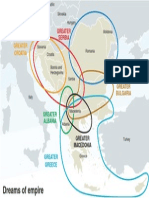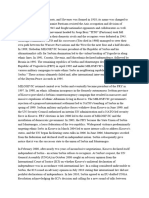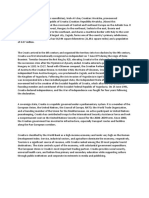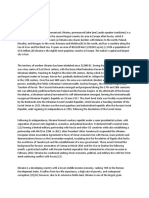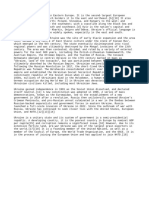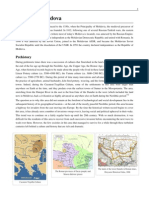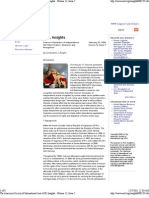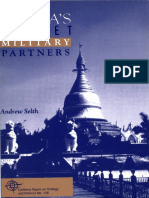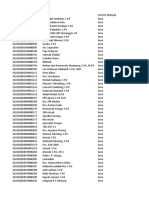0 ratings0% found this document useful (0 votes)
128 viewsTeacher: Fatime Gallopeni By: Blendon Kyçyku XI-9
Teacher: Fatime Gallopeni By: Blendon Kyçyku XI-9
Uploaded by
CassandraKosovo is a disputed territory in Southeastern Europe that declared independence from Serbia in 2008. It is landlocked in the central Balkan Peninsula, bordered by Albania, Macedonia, Montenegro, and Serbia. Kosovo has experienced a long history of rule under various empires and its capital and largest city is Pristina. The document outlines Kosovo's history under Roman, Byzantine, Bulgarian, Serbian, and Ottoman rule before becoming a UN protectorate after the Kosovo War in 1999 and declaring independence in 2008, though its status remains disputed.
Copyright:
© All Rights Reserved
Available Formats
Download as PPTX, PDF, TXT or read online from Scribd
Teacher: Fatime Gallopeni By: Blendon Kyçyku XI-9
Teacher: Fatime Gallopeni By: Blendon Kyçyku XI-9
Uploaded by
Cassandra0 ratings0% found this document useful (0 votes)
128 views6 pagesKosovo is a disputed territory in Southeastern Europe that declared independence from Serbia in 2008. It is landlocked in the central Balkan Peninsula, bordered by Albania, Macedonia, Montenegro, and Serbia. Kosovo has experienced a long history of rule under various empires and its capital and largest city is Pristina. The document outlines Kosovo's history under Roman, Byzantine, Bulgarian, Serbian, and Ottoman rule before becoming a UN protectorate after the Kosovo War in 1999 and declaring independence in 2008, though its status remains disputed.
Original Title
KOSOVO.pptx
Copyright
© © All Rights Reserved
Available Formats
PPTX, PDF, TXT or read online from Scribd
Share this document
Did you find this document useful?
Is this content inappropriate?
Kosovo is a disputed territory in Southeastern Europe that declared independence from Serbia in 2008. It is landlocked in the central Balkan Peninsula, bordered by Albania, Macedonia, Montenegro, and Serbia. Kosovo has experienced a long history of rule under various empires and its capital and largest city is Pristina. The document outlines Kosovo's history under Roman, Byzantine, Bulgarian, Serbian, and Ottoman rule before becoming a UN protectorate after the Kosovo War in 1999 and declaring independence in 2008, though its status remains disputed.
Copyright:
© All Rights Reserved
Available Formats
Download as PPTX, PDF, TXT or read online from Scribd
Download as pptx, pdf, or txt
0 ratings0% found this document useful (0 votes)
128 views6 pagesTeacher: Fatime Gallopeni By: Blendon Kyçyku XI-9
Teacher: Fatime Gallopeni By: Blendon Kyçyku XI-9
Uploaded by
CassandraKosovo is a disputed territory in Southeastern Europe that declared independence from Serbia in 2008. It is landlocked in the central Balkan Peninsula, bordered by Albania, Macedonia, Montenegro, and Serbia. Kosovo has experienced a long history of rule under various empires and its capital and largest city is Pristina. The document outlines Kosovo's history under Roman, Byzantine, Bulgarian, Serbian, and Ottoman rule before becoming a UN protectorate after the Kosovo War in 1999 and declaring independence in 2008, though its status remains disputed.
Copyright:
© All Rights Reserved
Available Formats
Download as PPTX, PDF, TXT or read online from Scribd
Download as pptx, pdf, or txt
You are on page 1of 6
Teacher: Fatime Gallopeni
By: Blendon Kyyku
XI-9
Kosovo is a disputed territory and partially recognised
state in Southeastern Europe that declared
independence from Serbia in February 2008 as the Republic of
Kosovo .
Kosovo is landlocked in the central Balkan Peninsula. With its
strategic position in the Balkans, it serves as an important link in
the connection between central and south Europe, the Adriatic
Sea, and Black Sea. Its capital and largest city is Pristina, and
other major urban areas include Prizren, Pej and Gjakova. It is
bordered by Albania to the southwest, the Republic of
Macedonia to the southeast, Montenegro to the west and the
uncontested territory of Serbia to the north and east. While
Serbia recognises administration of the territory by Kosovo's
elected government, it still continues to claim it as its
own Autonomous Province of Kosovo and Metohija.
In antiquity, the Dardanian Kingdom, and later the Roman
province of Dardania was located in the region. The area
was inhabited by several ancient Illyrian tribes. In the
Middle Ages, it was part of
the Byzantine, Bulgarian and Serbian Empires, and many
consider the Battle of Kosovo of 1389 to be one of the
defining moments in Serbian medieval history. Kosovo was
the core of the medieval Serbian state and it has been the
seat of the Serbian Orthodox Church from the 14th century
when its status was upgraded into a patriarchate. After
being part of the Ottoman Empire from the 15th to the
early 20th century, in the late 19th century Kosovo became
the centre of the Albanian independence movement with
the League of Prizren.
As a result of the defeat in the First Balkan War (1912
13), the Ottoman Empire ceded the Vilayet of Kosovo
to the Balkan League; the Kingdom of Serbia took its
larger part, while the Kingdom of Montenegro
annexed the western part before both countries
joined the Kingdom of Yugoslavia after World War I.
After a period of Yugoslav unitarianism in the
Kingdom, the post-World War II Yugoslav
constitution established the Autonomous Province of
Kosovo and Metohija within the Yugoslav constituent
republic of Serbia.
Long-term ethnic tensions between
Kosovo's Albanian and Serb populations left the
territory ethnically divided, resulting in inter-ethnic
violence, culminating in the Kosovo War of 199899,
part of the wider regional Yugoslav Wars. The war
ended with a military intervention of NATO, which
forced the Federal Republic of Yugoslavia to withdraw
its troops from Kosovo, which became a UN
protectorate under UNSCR 1244. On 17 February
2008 Kosovo's Parliament declared independence. It
has since gained diplomatic recognition as a sovereign
state by 111 UN member states, Taiwan, the Sovereign
Military Order of Malta, the Cook Islands and Niue.
Serbia refuses to recognise Kosovo as a state,
although with the Brussels Agreement of
2013 it has accepted the legitimacy of
Kosovar institutions. Kosovo has a lower-
middle-income economy and has
experienced solid economic growth over the
last decade by international financial
institutions, and has experienced growth
every year since the onset of the global
financial crisis in 2008.
You might also like
- Grade 8 - Religion - சுய கற்றல் கையேடு சைவநெறி PDFDocument21 pagesGrade 8 - Religion - சுய கற்றல் கையேடு சைவநெறி PDFGugathasan DharsanNo ratings yet
- Staff DutiesDocument22 pagesStaff DutiesRavi Pathiravithana100% (6)
- IGADF Afghanistan Inquiry Public Release VersionDocument465 pagesIGADF Afghanistan Inquiry Public Release VersionJacques GodboutbmNo ratings yet
- Kosovo: Teacher: Fatime Gallopeni By: Blendon Kyçyku XI-9Document6 pagesKosovo: Teacher: Fatime Gallopeni By: Blendon Kyçyku XI-9CassandraNo ratings yet
- Kosovo (Kosovo (: Pronounced Pronounced PronouncedDocument1 pageKosovo (Kosovo (: Pronounced Pronounced PronouncedOrgito LekaNo ratings yet
- Serbia Republic of Serbia: Република Србија Republika SrbijaDocument1 pageSerbia Republic of Serbia: Република Србија Republika SrbijaVojdan StefkovskiNo ratings yet
- SerbiaDocument1 pageSerbiaAndrei IoanNo ratings yet
- SerbiaDocument1 pageSerbiamiljkoyuNo ratings yet
- Serbia (Serbia (: Srbija, Republika SrbijaDocument1 pageSerbia (Serbia (: Srbija, Republika SrbijaAndrija StanimirovićNo ratings yet
- At A Glance: Continue Reading The Main StoryDocument2 pagesAt A Glance: Continue Reading The Main StorySatyaki MajumdarNo ratings yet
- Kosovo - A Short HistoryDocument2 pagesKosovo - A Short Historyandrew.mccornicheNo ratings yet
- CERES Country Profile - KosovoDocument18 pagesCERES Country Profile - KosovoCenter for Eurasian, Russian and East European StudiesNo ratings yet
- Bosnia and HerzegovinaDocument29 pagesBosnia and HerzegovinaEsmir Fazila BeganovicNo ratings yet
- Bosnia and HerzegovinaDocument1 pageBosnia and Herzegovinarary1601No ratings yet
- North Macedonia (Macedonian: of North Macedonia (MacedonianDocument1 pageNorth Macedonia (Macedonian: of North Macedonia (MacedonianJorge ContrerasNo ratings yet
- Kosovo Independance EssayDocument2 pagesKosovo Independance EssayThomas NoonanNo ratings yet
- Bosnia and Herzegovina (: ListenDocument1 pageBosnia and Herzegovina (: ListenpaxaugustaNo ratings yet
- History of Kosovo and Europian IntegrationDocument1 pageHistory of Kosovo and Europian IntegrationMichal TrgalaNo ratings yet
- Član 8Document1 pageČlan 8veronika.puljic19No ratings yet
- Exploring Kosovo : A Journey Through History, Culture, and NatureFrom EverandExploring Kosovo : A Journey Through History, Culture, and NatureNo ratings yet
- Kosovo-The Crown of Serbian HistoryDocument12 pagesKosovo-The Crown of Serbian Historyasprosaetos100% (1)
- MACEDONADocument1 pageMACEDONAАнастасијаСтаменковскаNo ratings yet
- SerbiaDocument6 pagesSerbiamasa.zoric08No ratings yet
- Bosnia and HerzegovinaDocument11 pagesBosnia and HerzegovinacuveniNo ratings yet
- CRS Report For Congress: Kosovo: Historical Background To The Current ConflictDocument6 pagesCRS Report For Congress: Kosovo: Historical Background To The Current ConflictPaulo SilvaNo ratings yet
- Washington' S Kosovo Policy: Consequences and Contradictions, Cato Policy AnalysisDocument27 pagesWashington' S Kosovo Policy: Consequences and Contradictions, Cato Policy AnalysisCato Institute100% (1)
- JesamvaszajeboDocument33 pagesJesamvaszajeboazemina23No ratings yet
- A Short Timeline of KosovoDocument3 pagesA Short Timeline of KosovoajscarlNo ratings yet
- Serbia: Balkans YugoslaviaDocument21 pagesSerbia: Balkans YugoslaviaJunior PayatotNo ratings yet
- The Kosovo Peacekeeping MissionDocument5 pagesThe Kosovo Peacekeeping Missionapi-405041135No ratings yet
- North Macedonia: Macedonia and FYROM) - in June 2018, Macedonia and Greece Resolved The Dispute WithDocument1 pageNorth Macedonia: Macedonia and FYROM) - in June 2018, Macedonia and Greece Resolved The Dispute WithOrgito LekaNo ratings yet
- North Macedonia: Macedonia and FYROM) - in June 2018, Macedonia and Greece Resolved The Dispute WithDocument1 pageNorth Macedonia: Macedonia and FYROM) - in June 2018, Macedonia and Greece Resolved The Dispute WithOrgito LekaNo ratings yet
- A Study of International Conflict Management With An Integrative Explanatory Model: The Case Study of The Kosovo ConflictDocument11 pagesA Study of International Conflict Management With An Integrative Explanatory Model: The Case Study of The Kosovo ConflictpedalaroNo ratings yet
- KosovoDocument3 pagesKosovopurnimawork36No ratings yet
- Operation Joint Guardian The U.S. Army in KosovoDocument60 pagesOperation Joint Guardian The U.S. Army in KosovoBob Andrepont100% (1)
- Between Serb and Albanian A History of KosovoDocument331 pagesBetween Serb and Albanian A History of KosovoIgor Spiric100% (1)
- Bosnia and HerzegovinaDocument107 pagesBosnia and HerzegovinaMushtaq AhmadNo ratings yet
- The Kosovo ConflictDocument51 pagesThe Kosovo ConflictEdwin Don Padrilanan100% (1)
- Balkan Dreams of EmpiresDocument1 pageBalkan Dreams of EmpiresContributor BalkanchronicleNo ratings yet
- The Short History of KosovoDocument3 pagesThe Short History of KosovoHajrullahu50% (2)
- Serbia Factbook 2024Document2 pagesSerbia Factbook 2024bg.twisterNo ratings yet
- CroatiaDocument1 pageCroatiaAdrian DumitruNo ratings yet
- Croatia (Croatia (Croatian: Republika Hrvatska,: Kroh - SHƏDocument1 pageCroatia (Croatia (Croatian: Republika Hrvatska,: Kroh - SHƏRadhika PrasadNo ratings yet
- UKRAINEDocument2 pagesUKRAINEHiroNo ratings yet
- MUNTENEGRUDocument11 pagesMUNTENEGRUmagdadriana79No ratings yet
- North Macedonia HistoryDocument1 pageNorth Macedonia HistoryLucidny JRNo ratings yet
- Bosnia Serbia ConflictDocument7 pagesBosnia Serbia ConflictAaesta PriyestaNo ratings yet
- JugoslavijaDocument19 pagesJugoslavijamitricdanilo1No ratings yet
- Ukraine (A) Is A Country in EasternDocument1 pageUkraine (A) Is A Country in Easternplayingpiano2100No ratings yet
- Twentieth-Century Kosovo-MetohijaDocument23 pagesTwentieth-Century Kosovo-MetohijaМилосављевић АлександраNo ratings yet
- SloTan tekst (english)Document2 pagesSloTan tekst (english)cimbaljevic.dankoNo ratings yet
- DokumentDocument2 pagesDokumentveronika.puljic19No ratings yet
- UkraineDocument53 pagesUkrainePhilip Gavan100% (1)
- Serbia TimelineDocument2 pagesSerbia TimelineajscarlNo ratings yet
- North Macedonia (Macedonia Until February 2019), Officially The Republic of North Macedonia, Is ADocument15 pagesNorth Macedonia (Macedonia Until February 2019), Officially The Republic of North Macedonia, Is AЈованаNo ratings yet
- Ethnic Conflicts NotesDocument4 pagesEthnic Conflicts Notessumbulfaraz777No ratings yet
- History of MoldovaDocument18 pagesHistory of MoldovamoufkirNo ratings yet
- Article - Kosovo's Declaration of IndependenceDocument8 pagesArticle - Kosovo's Declaration of IndependenceKaye MendozaNo ratings yet
- YugoslaviaDocument2 pagesYugoslaviaVirat GadhviNo ratings yet
- Muhadri - THE - INVASION - OF - KOSOVO - FROM - THE - OTTOMANS FullDocument14 pagesMuhadri - THE - INVASION - OF - KOSOVO - FROM - THE - OTTOMANS FullMarka Tomic DjuricNo ratings yet
- Chandrauta MLV 2073Document5 pagesChandrauta MLV 2073Er Jc Ajay ThakulNo ratings yet
- Atomic Bombings of Hiroshima and Nagasaki - WikipediaDocument1 pageAtomic Bombings of Hiroshima and Nagasaki - Wikipediawatersplash2010No ratings yet
- Alcohol and Automobiles Don't MixDocument16 pagesAlcohol and Automobiles Don't MixMark CheneyNo ratings yet
- Finnish Pistols and RevolversDocument91 pagesFinnish Pistols and RevolversRenato Spinelli100% (1)
- बिज्ञापन वेवसाइट PDFDocument4 pagesबिज्ञापन वेवसाइट PDFAnil Subedi HeroNo ratings yet
- 136 Burma's Secret Military Partners (Canberra Papers On Strategy and Defence) Andrew Selth 86p 0731527755 PDFDocument104 pages136 Burma's Secret Military Partners (Canberra Papers On Strategy and Defence) Andrew Selth 86p 0731527755 PDFPyae Phyo AungNo ratings yet
- Netherworld Rogues Gallery For Feng Shui RPGDocument3 pagesNetherworld Rogues Gallery For Feng Shui RPGdaywalker44No ratings yet
- Daftar Penguji ToT UkinDocument58 pagesDaftar Penguji ToT UkinAhmad Faisal TariganNo ratings yet
- AAB Proceedings - Issue #36Document12 pagesAAB Proceedings - Issue #36The MalumNo ratings yet
- Contract Fy10Document7 pagesContract Fy10Angel AngelNo ratings yet
- Stephen Donnelly CVDocument3 pagesStephen Donnelly CVapi-285495893No ratings yet
- Sten Plans The STEN MKIIDocument24 pagesSten Plans The STEN MKIIbvd1940100% (2)
- Pyi Myanmar Department ScandalDocument2 pagesPyi Myanmar Department ScandalniknaymanNo ratings yet
- Summarized ChaptersDocument8 pagesSummarized ChaptersJhazmineNo ratings yet
- Kancolle RPG - Construction Book Two: 1. Ship Girl SummaryDocument38 pagesKancolle RPG - Construction Book Two: 1. Ship Girl SummaryLiander BelonatoNo ratings yet
- २. खरिद प्रकृया र खरिद इकाइDocument30 pages२. खरिद प्रकृया र खरिद इकाइAnkit ChapagainNo ratings yet
- 11th - 12th May Thunderstorm Current AffairsDocument9 pages11th - 12th May Thunderstorm Current AffairsAsrar Hussain BhatNo ratings yet
- 322-70 Smoke GogglesDocument1 page322-70 Smoke GogglesazharetasNo ratings yet
- Sno Rfi Raised Date Rfi No Rfi Raised by Structure Compoment Description Time Proposed Date of InspectionDocument1 pageSno Rfi Raised Date Rfi No Rfi Raised by Structure Compoment Description Time Proposed Date of InspectionjebaNo ratings yet
- Behind The Presidential Curtain Noble MararaDocument302 pagesBehind The Presidential Curtain Noble Mararasmlingwa100% (2)
- The Man in The Nautical HatDocument25 pagesThe Man in The Nautical HatAustin Macauley Publishers Ltd.No ratings yet
- Second Punic War - WikipediaDocument19 pagesSecond Punic War - WikipediaEliezer BenjaminNo ratings yet
- Feeding Mars Logistics in Western Warfare From The Middle Ages To The Present (John A Lynn) (Z-Library)Document339 pagesFeeding Mars Logistics in Western Warfare From The Middle Ages To The Present (John A Lynn) (Z-Library)1072867317No ratings yet
- MTVRDocument8 pagesMTVRjfman100% (1)
- SHARP GuidebookDocument88 pagesSHARP GuidebookChris WhiteheadNo ratings yet
- Books: IslamDocument76 pagesBooks: IslamBooks for IslamNo ratings yet
- FraternizationDocument12 pagesFraternizationRitesh BatraNo ratings yet









